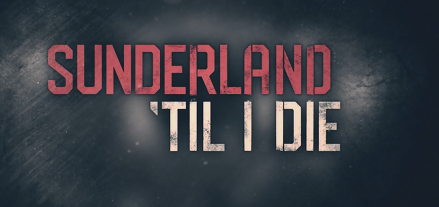Lockdown review: Sunderland ‘Til I Die
Written by @JamesMartin013
There’s no football of any description – fantasy or otherwise – for at least the next few weeks, which leaves a desperate need for a sports fix.
Belarusian league aside, most people are finding the best option to be sports books and documentaries.
In the second instalment of his mini-series, James Martin reviews the second season of Sunderland ‘Til I Die…
I can’t believe I wasted my The Office analogy on the Manchester City documentary.
Charlie Methven, executive director at Sunderland, is pure Michael Scott in the second season of Sunderland ‘Til I Die. His impromptu office DJ set to demonstrate how he would improve atmosphere at the Stadium of Light sets the tone in the first episode, and if anything he becomes more cartoonish as the season progresses. Unlike its Etihad counterpart, however, the result is not a glib end product – some clever production allows the management to inadvertently poke fun at itself, regularly leaving prolonged beats to let strange comments sink in, which only serves to heighten the sympathy evoked for the supporters.
Unlike season one, their pain is at least contrasted with some moments of ecstasy along the way. The packed-out crowd for the Boxing Day game genuinely feels like a moment of potential rebirth, captured effectively by a clip of the long-serving club commentator remarking that he is once again surrounded by fans from his position high up on the gantry. The documentary does give Methven some credit for the ticket drive, in fairness, although his frankly bullying motivational methods again allow people to draw impressions of him without the programme needing to spell anything out.
The way the season unfolded on the pitch for Sunderland perhaps makes for even more compelling viewing than the previous series. The first season of the show was excellent in an ‘I can’t tear my eyes away’ kind of fashion, where the brutal reality of constantly losing was depicted vividly at both terrace and boardroom level. The campaign captured in this season is in League One, and the goal within the club is clear from the outset – win promotion back to the Championship.
Plenty of groundwork is laid around this premise: for those who followed the season in real-time, this sets up a huge sense of dramatic irony. This is a technique whereby the audience knows something that the characters do not – it is used to massive effect in the documentary, as every jarring objective thrown out by Methven or hopeful comment from a supporter is coloured by the knowledge that this will not end well. It is one of the greatest strengths of the documentary that it can be enjoyed in this way while also holding its own, albeit with fewer layers, for those who watch without first knowing how the football season panned out.
For anyone still not yet aware, the climax involved two defeats at Wembley – first in the Checkatrade Trophy final, then again in the playoff final. From a documentary-maker’s perspective, this is pure gold. The build-up can be laid on thick and strong, encapsulating the moments of euphoria as the ultimate goal comes tantalisingly closer, only for everything to come crashing down at the death in the most heart-rending of fashions. At times, Sunderland ‘Til I Die is arguably guilty of slightly overplaying their hand when it comes to building up the expectations – nonetheless, this does little to detract from the genuine emotion evoked when the inevitable collapse happens.
Even the chairman, Stewart Donald, cuts a figure worthy of some sympathy. It would have been easy for the documentary to construct a narrative of shady, uncaring owners running a big club into the ground, but it makes clear that he is genuinely desperate for the club to succeed. He is portrayed as a man pursuing a deeply-held dream to run the football club and turn it around – one of the most poignant scenes is filmed in his home, where his partner is asking him how long he can keep going. “I don’t want to sell”, he says simply.
He also appears very attuned to the fact he is accountable to the fans, and his decisions are guided by a desire to give them what they want. However, the high (low?) light of the documentary shows how that can be a double-edged sword. Supporters often speak of how they want ‘football people’ in charge, but the episode devoted to the capture of Will Grigg shows the need to have heads as well as hearts in the boardroom.
Aware of the need to bring in a striker to replace Josh Maja, who had been manoeuvred out of the club in an episode leaving the viewer feeling sorry for essentially everyone except the agent, Stewart Donald has set his heart on Wigan forward Will Grigg. Against the advice of everyone, including manager Jack Ross, he continually increases the bid in a frenzied deadline day. The most surreal scene sees Tony Coton, the head of player recruitment, sitting on his laptop and watching a video of fans singing the viral chant ‘Will Grigg’s on Fire’ – hours later the league transfer record had been smashed.
To the surprise of nobody, least of all the manager, this does not prove to be value for money. The documentary definitely takes a turn for the bleaker at this point – it is impressive how much it can convey with crowd noise, regularly stripping everything else back to leave just the supporters. For the first couple of episodes, the roars and the chants set an upbeat tone; this gradually gives way to groans and shouts of abuse.
The culmination, of course, is the playoff final defeat. It could hardly have been scripted – a stoppage time winner to condemn Sunderland to another season in League One, the one thing Methven has been doggedly insisting cannot happen throughout the campaign. “Why is it never us?”, one supporter asks tearfully. It is impossible not to empathise, having watched these people follow the team all season, twice making the pilgrimage to Wembley, only to suffer yet more heartbreak.
The final episode ends on a barren background, with faintly threatening music playing: the words Sunderland ‘Til I Die stand alone in blood-red. The almost horror-esque feel does not seem out of place. It is a fitting way to wrap up another very strong season of a documentary that offers genuine boardroom insight while also keeping the many trials and tribulations of the fans front and centre.
Review written by James Martin















Pingback: Sunderland ‘Til I Die : Lockdown Review